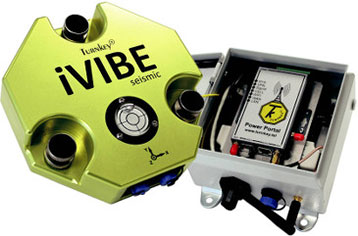As you’re probably aware, vibrations can be dangerous in the construction industry, along with various other contexts. There are a number of reasons for this.
For starters, vibrations can adversely affect the structural integrity of buildings, bridges and other infrastructure. Over time, they can weaken materials, causing everything from cracks and fractures to, at worst, collapses.

They can also pose risks for employees working at construction sites, when using heavy machinery and tools. The vibrations from such devices can cause tiredness, discomfort and even injuries like hand-arm vibration syndrome (HAVS) or whole-body vibration syndrome (WBVS).
Excess vibrations can lead to the costly damage of machinery, tools and equipment.
Over time, they can loosen bolts, bearings, and other components, leading to malfunction or failure. This can result in expensive repairs and unwanted downtime.
Vibrations also have a detrimental effect on the environment. Too many vibrations end up disturbing structures, wildlife habitats and often sensitive ecosystems. In many cases, they affect nearby residents and lower their quality of life.
Prolonged exposure to vibrations can have various negative effects on people, including
musculoskeletal disorders, hearing loss, and stress-related ailments.
To reduce such risks, it’s vital to know when to take measures like damping materials, implementing vibration isolation techniques, conducting regular inspections, and providing appropriate personal protective equipment (PPE) for workers.
Furthermore, regulatory agencies often establish guidelines and standards to limit vibration levels in construction and other industries to ensure safety and minimize adverse impacts.

Turnkey Instruments provide reliable noise and vibration testing equipment in the UK which provides highly accurate measurements.
The iVIBEseismic is our combined noise and vibration monitor. It provides a user-friendly and reliable approach to monitoring noise and vibration on-site in any environment.
Our vibration testing equipment is used in various industries in the UK for assessing the durability, reliability, and performance of products and components subjected to vibration.
Here are 10 reasons why our vibration testing equipment is invaluable:
- It can help you meet quality standards. Vibration testing ensures that products meet quality standards by identifying potential weaknesses or defects that could compromise performance or safety.
- Make it easier to predict the reliability and lifespan of your products. Vibration testing equipment helps to simulate real-world vibration conditions, allowing manufacturers to address potential issues before they arise.
- Optimise the performance of your product designs and materials. We can help you enhance their performance under vibrational stress, leading to better overall functionality.
- Meet compliance and regulations in the UK. Many industries have stringent regulations and standards regarding vibration resistance. Vibration testing ensures compliance with these standards, reducing the risk of liability and regulatory penalties.
- Reduce the costs associated with product failures and recalls. By identifying and rectifying design flaws or weak points early in the development process, vibration testing can save significant costs associated with warranty claims, recalls, and product failures.
- Speed up the testing process and save yourself time. Vibration testing can simulate years of real-world usage in a fraction of the time, allowing manufacturers to expedite the testing process and bring products to market faster.
- Mitigate the risks associated with product failure. This is particularly critical for applications such as aerospace, automotive, and medical devices, where failure could have severe consequences.
- Improve levels of customer satisfaction. Our vibration and noise testing equipment can help satisfy your customers with greater ease, with your products more likely to perform as desired.
- Give your company competitive advantages. Businesses that invest in vibration testing equipment demonstrate a commitment to quality and reliability, which can give them a competitive edge in the marketplace.
- Have a device that helps with research and development. Engineers can study the behaviour of materials and components under different vibrational conditions, leading to innovations in product design and manufacturing processes.
One of the biggest advantages of our device is that it offers internet connectivity so sites can be monitored remotely. It’s therefore the ideal solution for anyone needing to access data about remote or multiple sites from another location.
Data is available in real-time for monitoring, analysis and reporting. It can easily be accessed on PC, mobile or tablet from anywhere providing there is an internet connection.
Remote monitoring enables users to enjoy continuous observation, enabling early detection of any deviations from normal operation.
This early warning system can prevent costly downtime and maintenance. It also provides real-time data on vibration levels, allowing engineers to monitor equipment health without needing to be physically present at the site. This is particularly beneficial for monitoring assets located in remote or hazardous environments.
By identifying issues early, you can prevent unexpected breakdowns and costly repairs.
Remote monitoring eliminates the need for manual inspections, reducing labour costs associated with on-site visits and inspections.
Remote monitoring minimises the need for personnel to be physically present in hazardous environments, reducing the risk of accidents and injuries. Additionally, by detecting issues early, there is less chance of catastrophic failures that could pose safety risks.
If you’re looking for noise and vibration testing equipment in the UK, discover more about the iVIBEseismic. Or don’t hesitate to contact our friendly team for more information.


